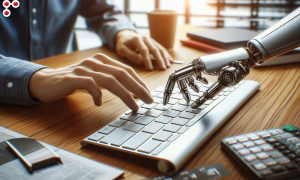Over the past years, there has been a growth of Artificial Intelligence (AI) in digital marketing, which has also transformed the Search Engine Optimization (SEO) landscape. With AI becoming more and more advanced, the question AI vs Human SEO – Who’s dominating the race to top Google rankings? Arises. In this blog let’s dive into the competitive battle between AI-generated content and human expertise in SEO.
The Role of AI in Search Rankings
AI in search rankings has become increasingly prominent in recent years. With algorithms like BERT and RankBrain, Google leverages AI to understand the queries better, improve search results, and perform user behavior analysis. These algorithms are important in interpreting complex queries, semantic searches, and long-tail keywords.
The advanced AI solutions offered by Google provide sophisticated search solutions that are no longer limited to simple keyword matching but understand the meaning of the words used and what the user hopes to achieve with the search, thus giving more attention to the context. This implies that plenty of focused content development is done using AI-based tools such as GPT models and ChatGPT. While doing so, Such AI tools can analyze millions of data concerning current topics to come up with appropriate content within a short time frame.
However, while AI is efficient at crunching numbers and pulling from data to create relevant content, it still struggles with creativity, emotional nuance, and originality—the areas where **human SEO** truly shines.
Nonetheless, AI is effective when it comes to handling calculations and making use of data to create good content, but it fails in terms of creating new work, bringing in emotions and developing original ideas—these are the areas where human SEO excels.
Human vs. AI Content Creation:
Pros and Cons
The competition between human vs. AI content creation has led to interesting discussions among digital marketers.

Pros of AI Content Creation:
1. Speed: AI is able to quickly generate a great amount of content that can support SEO needs.
2. Consistency: AI will be integrating the keywords and making sure that metadata and other SEO best practices are in place in the content.
3. Data-Driven: AI tools can analyze vast data sets, providing valuable insights for content optimization, trend analysis, and audience targeting.
Cons of AI Content Creation:
1. Lack of Creativity: The negative side of AI-generated content is that it is often not original and has a shallow view, i.e., it cannot connect with a human audience on a personal or emotional level.
2. Contextual Errors: AI may take the liberty of misinterpreting the qualities of language or cultural references which entail the content to be robotic and off the point.
On the other hand, humans bring qualities to the table that AI cannot replicate:

Pros of Human Content Creation:
1. Authenticity and Creativity: Humans understand cultural differences, trends and emotions better than AI. Human generated content is more authentic.
2. Adaptability: People are able to modify content using instant feedback, changing market conditions, and quickly rising trends.
3. Storytelling: Crafting compelling narratives that connect with the audience is a human specialty that AI struggles to mimic.
Cons of Human Content Creation:
1. Time-Consuming: Human-generated takes longer to be created that makes it a decision of missing out on fast SEO practices.
2. Inconsistent: Unlike AI, human content can vary in quality and SEO effectiveness, depending on the writer.
AI Impact on Google Rankings: The Best of Both Worlds?
As the battle between AI and human content continues, the solution may lie in leveraging the strengths of both. Combining AI’s data-driven insights and content creation efficiency with human creativity and emotional intelligence can lead to more effective SEO strategies.
Top-ranked websites use AI tools for competitor analysis, keyword gap detection, and technical SEO optimization. Unlike the technical aspect that already has been easily automated, the human factor is still necessary in content creation. AI when it comes to creating genuine, engaging content is useless. Humans will always be individuals and more likely to generate content that truly meets user needs.
Furthermore, Google rankings are becoming more and more inclined to high-quality, user-focused content. Google’s platform has introduced Novel Neural Network for Natural Language Processing (NDoLL) in its algorithms with Natural Language Understanding (NLU) to make the pages earn the rank by offering the audience value, rather than forcing keywords into them. Empathy and connection in writing are unique to humans, something AI can never fully replicate or replace. Writing is a relational trust building thing through credibility and story and contact with the reader, something AI can never do.
Conclusion: AI vs. Human SEO—Who Wins?

Fact is there is no definite winner in AI vs. human SEO. However, a blended method seems to be the best method for enhancing AI effect on Google placement. While artificial intelligence is fast, reliable, and data-based, humans are creative, unique, and flexible. Digital marketers can continue to lead in the changing world of search by combining the best of both.
Its not really AI vs Human – but the extent to which AI and humans join forces and giving the users the best experience. Consequently, instead of actively competing, both AI and humans should cooperate closely to conjure up a search engine optimization that will not only be desirable but also interactive and influential for the users.
























